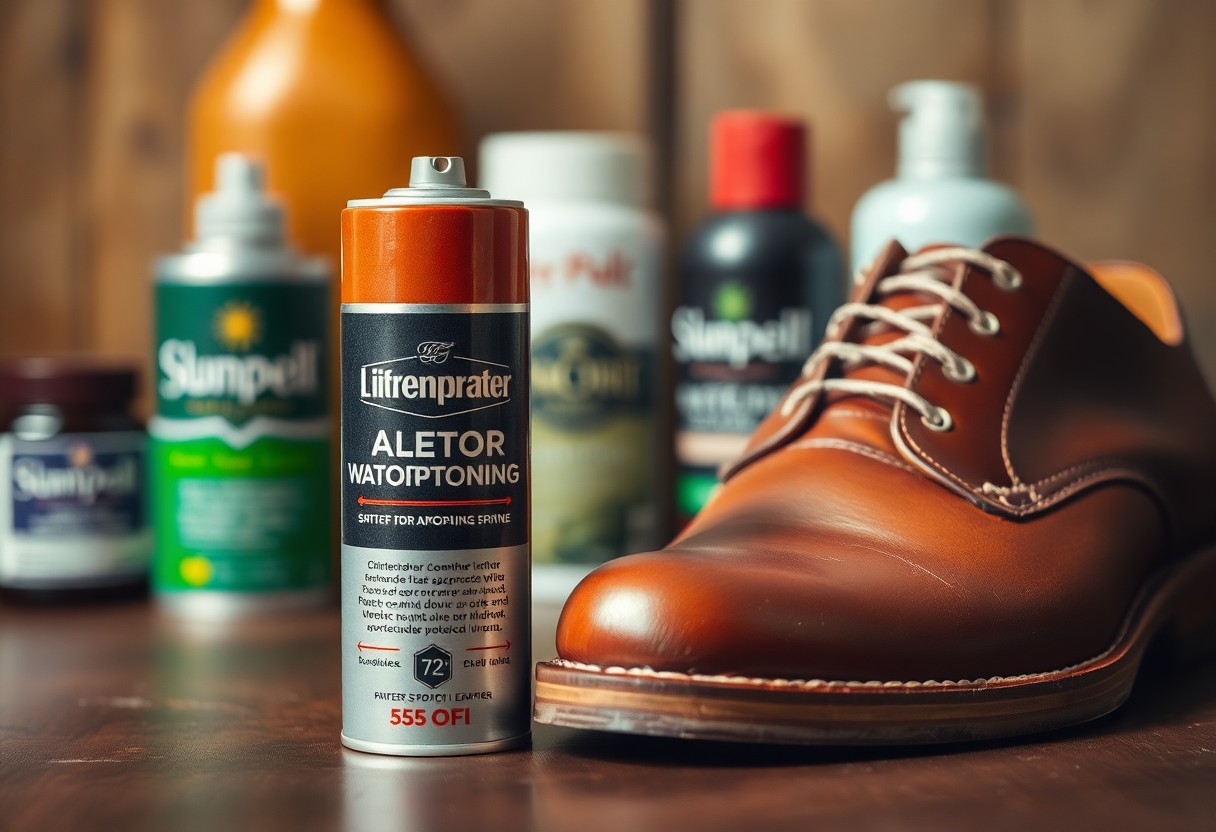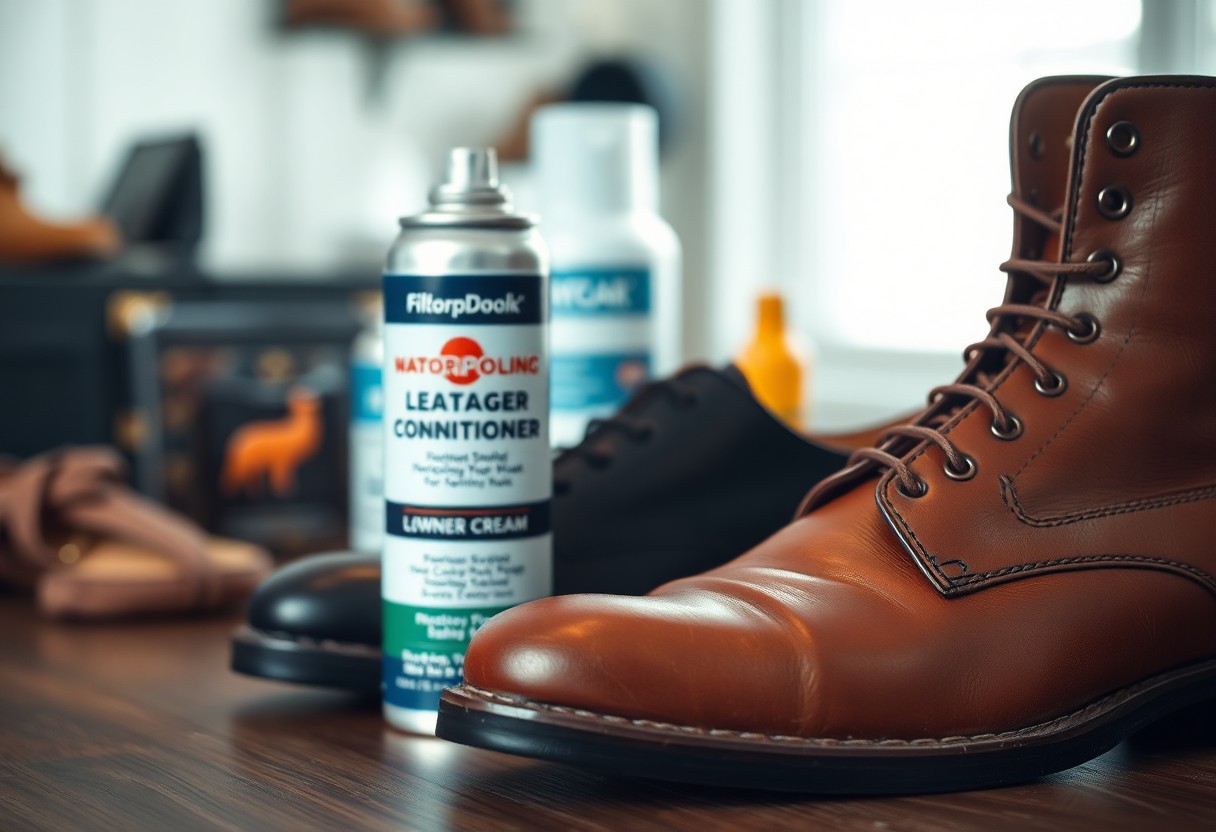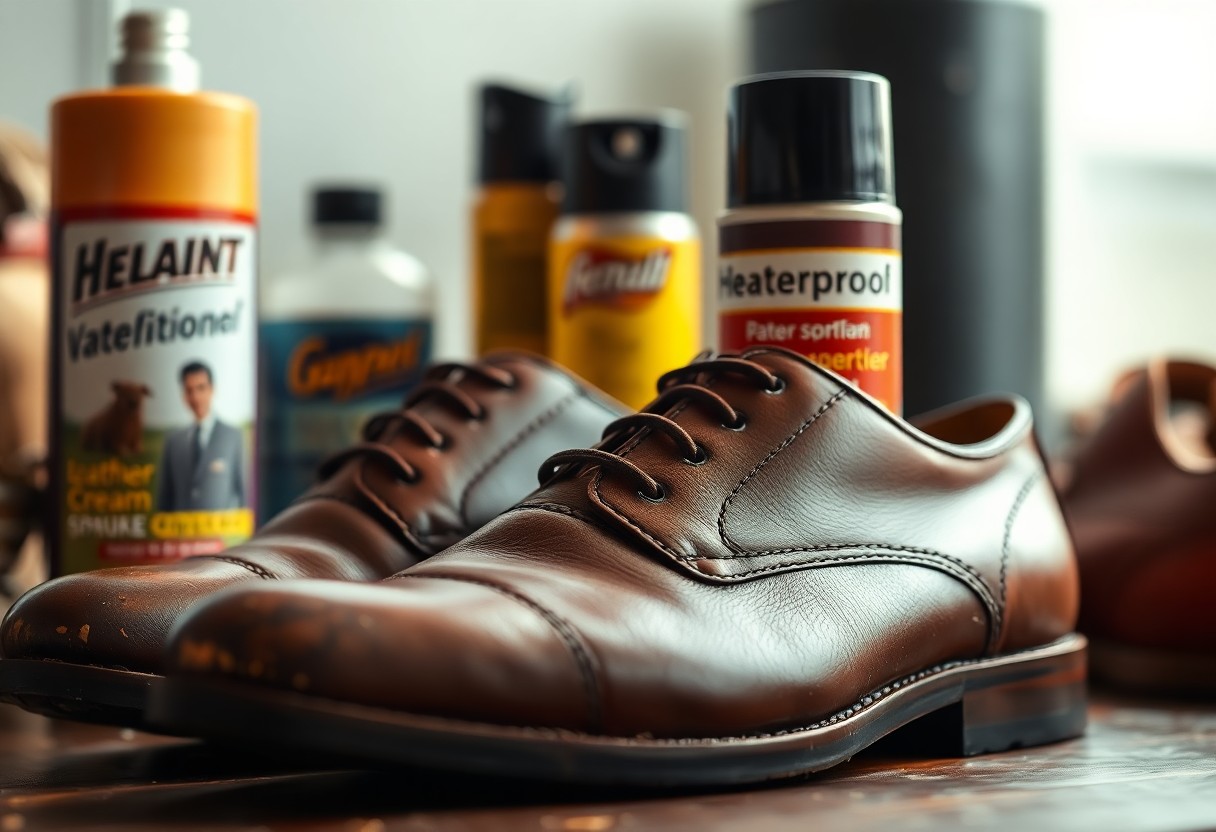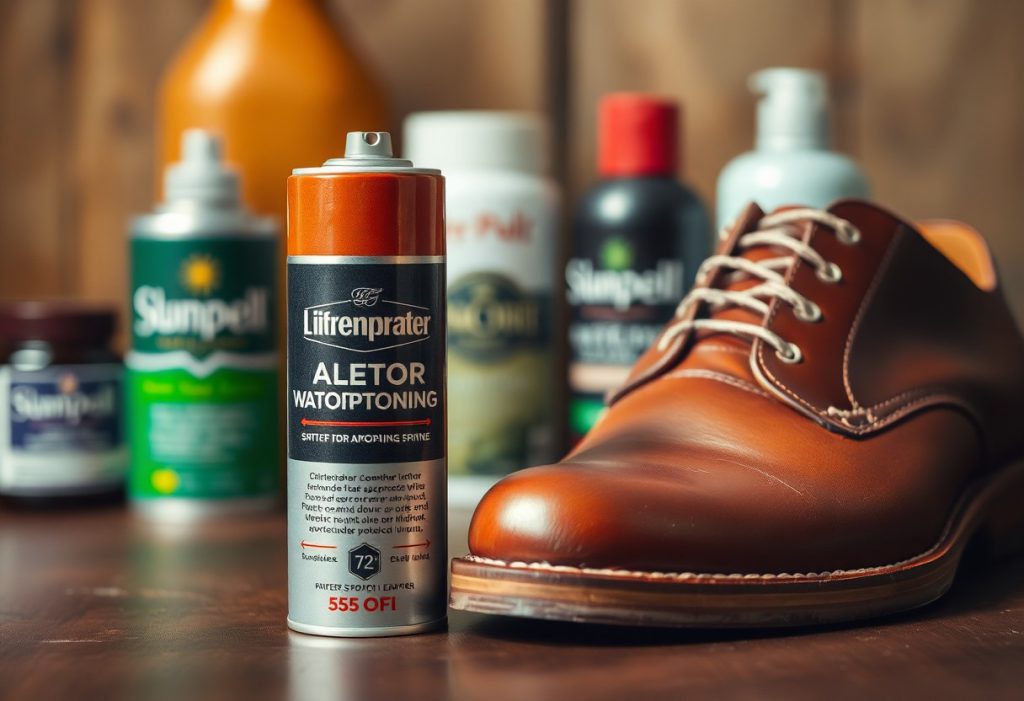Leather care mistakes can lead to irreversible damage to your cherished footwear. One of the most prevalent errors is applying waterproofing spray to smooth leather. Although these sprays might appear to offer a quick solution for protecting your shoes, they can block vital nutrients from penetrating the leather, ultimately resulting in a dry, cracked appearance over time. Smooth leather is inherently designed with natural water-resistant properties within its grain layer, necessitating the use of shoe creams and waxes for adequate nourishment and protection. Rather than relying on sprays, opt for premium leather conditioners and wax polishes that nourish and safeguard the leather, ensuring its longevity and preserving its natural characteristics.
Unlocking the Essentials of Leather Protection for Extended Durability
To prolong the lifespan of your leather goods, it's crucial to grasp their inherent protective features. Full grain leather boasts natural water-resistant properties due to its tightly interwoven fiber structure. However, maintaining these characteristics requires persistent and careful upkeep. The durability of your leather is directly linked to the degree of care it receives. Utilizing waterproofing sprays can compromise the leather's breathability, potentially leading to severe damage over time if not properly managed.
Discovering the Exceptional Advantages of Full Grain Leather
After the tanning process, full grain leather retains its original surface layer, which provides unmatched natural protection. Products made from this material preserve the intact grain layer, offering resistance against moisture and wear. This outer layer is rich in natural oils and fibers that form a protective shield, making additional waterproofing sprays not only unnecessary but potentially detrimental to the leather's well-being.
Understanding Leather's Moisture Regulation and Aging Process
Grain leather must maintain its capacity to absorb and expel moisture effectively. The pores present in your leather allow it to breathe and manage moisture, keeping it supple and avoiding unsightly cracks. However, the application of waterproofing sprays can seal these pores, restricting essential airflow and disrupting the natural moisture equilibrium. Moreover, as leather ages, it requires adequate nourishment through conditioning products. When waterproofing sprays are used, they create a barrier that prevents essential conditioning oils from penetrating the leather, resulting in dryness and brittleness over time. Regularly applying leather cream enables your leather to age gracefully, developing a rich and appealing patina.

Understanding the Risks Associated with Waterproofing Spray Application
Many individuals mistakenly believe that waterproofing spray is the ultimate defense for their leather shoes, but this common practice can result in serious damage to your footwear. While these sprays create a temporary protective barrier against moisture, they simultaneously inhibit essential nutrients from penetrating the leather, setting the stage for potential long-term deterioration.
Correcting Common Misconceptions Driven by Marketing Hype
Due to aggressive marketing strategies and well-intentioned advice from retail employees, you might think that waterproofing spray is essential for all leather shoe types. This myth has been perpetuated by many shoe retailers, largely because of the high profit margins and frequent re-purchase rates associated with these products. However, the reality is that regular smooth leather possesses natural protective qualities that do not necessitate additional spray-on barriers for effective safeguarding.
Evaluating Immediate Benefits Versus Long-term Consequences
The deterioration of your leather shoes starts when waterproofing sprays create a barrier that prevents essential oils and conditioning agents from penetrating the leather. Although you may initially observe improved water resistance, the truth is that your leather gradually becomes dry and brittle without the crucial nourishment it needs. The repercussions of using waterproofing sprays on smooth leather extend beyond superficial protection. Your leather demands consistent nourishment to maintain its flexibility and durability. When shoe creams and conditioners cannot permeate the leather due to the spray barrier, the material runs the risk of cracking and deterioration, significantly reducing your shoes’ lifespan. Natural waxes and suitable conditioning provide superior long-term protection while fostering the leather's health.

Delving into the Science of Effective Leather Care
A crucial aspect of successful leather maintenance is comprehending its molecular structure. The collagen fiber networks within your leather shoes require both protection and nourishment. The products you choose can either coat these fibers or penetrate them. This interaction is vital for the long-term well-being of your leather footwear.
Recognizing the Importance of Regularly Nourishing Leather
It’s imperative to acknowledge that your leather shoes require ongoing nourishment to sustain their quality. The natural oils contained within your leather serve to prevent cracking and maintain flexibility. Over time, these oils diminish due to routine wear and exposure to various environmental elements. To preserve the leather’s structural integrity, replenishing these oils through consistent conditioning is crucial.
Understanding the Barrier Effects of Waterproofing Sprays
A major drawback of waterproofing sprays is their propensity to create a barrier. When applied to smooth leather, these sprays form an impermeable layer that obstructs both water and essential nutrients. This barrier prevents your leather care products from effectively penetrating the surface, leading to a gradual decline in the leather’s quality over time.
The barrier effect caused by waterproofing sprays sets off a problematic cycle for your shoes. While these sprays effectively block water, they simultaneously hinder the absorption of conditioning products that are critical for maintaining the leather's health. Consequently, the leather may appear protected on the surface but is actually becoming dehydrated and brittle underneath. Silicone-based sprays are particularly harmful, establishing a lasting barrier that is challenging to remove without damaging the leather.
Implementing Proven Strategies for Leather Protection
Contrary to popular belief, your smooth leather shoes require specific care techniques that complement the natural properties of full-grain leather. The most effective approach combines traditional methods with products designed to enhance the leather’s inherent protective qualities, ensuring both immediate defense and enduring durability for your footwear.
Utilizing the Benefits of Wax-based Products
An exceptionally effective alternative to waterproofing sprays is the use of high-quality wax-based solutions. These products work in harmony with your leather’s natural grain rather than against it. Applying wax polish forms a protective barrier that still allows the leather to breathe, making it particularly beneficial for toe caps and areas subject to significant wear.
Improving Leather Quality with Regular Cream and Conditioner Application
In contrast to traditional spray treatments, leather creams and conditioners deliver essential nourishment while preserving the leather’s natural protective abilities. Your shoes benefit from oils that penetrate deeply into the material, preventing drying and cracking. Additionally, regular application of cream and conditioner creates a cumulative effect that enhances leather quality over time. The natural oils present in these products fortify the leather’s flexibility and strength, allowing it to develop a stunning patina. It is advisable to apply these products every 4-6 wears to maintain optimal leather condition.

Identifying Appropriate Situations for Waterproofing Spray Use
In contrast to smooth leather, certain materials greatly benefit from waterproofing sprays. These products create an effective water-resistant barrier on specific materials that lack inherent protection. Waterproofing sprays are particularly advantageous for suede, nubuck, and various textiles, where the material structure does not provide natural moisture resistance.
Enhancing Suede and Nubuck with Waterproofing Spray
By treating your suede or nubuck footwear with waterproofing spray, you significantly boost their resistance to moisture damage. Although many modern suede materials come pre-treated with factory waterproofing, additional protection can help maintain this defense over time. The spray application establishes a protective barrier that effectively prevents moisture from infiltrating these delicate materials.
Providing Optimal Protection for Textile Footwear
In addition to leather alternatives, textile footwear requires specialized protection against water damage. Materials such as canvas, mesh, and synthetic fabrics can achieve enhanced water resistance through proper spray application. Most textile materials are inherently absorbent, making them susceptible to water damage and staining.
Furthermore, waterproofing sprays designed for textiles help maintain the shape and color of your shoes. The barrier they create also prevents dirt and debris from embedding into the fabric fibers. It is advisable to reapply the spray every 3-4 months for optimal protection, depending on the frequency of usage and prevailing weather conditions.
Insights and Recommendations from Leather Care Experts
Not all leather treatments yield the same results. Leather care professionals strongly advise against using waterproofing sprays on smooth leather. Your full-grain leather shoes require specialized care that allows them to breathe and absorb nourishing treatments. Using unsuitable products can lead to leather damage that could cost hundreds of dollars.
Expert Insights from Tannery Professionals
To preserve the quality of leather, tannery specialists emphasize that full-grain leather inherently possesses water-resistant qualities in its outer layer. Maintaining the leather's protective attributes necessitates the application of oils and waxes. Waterproofing sprays can impede these essential treatments from penetrating the leather.
Professional Cobblers’ Recommendations for Leather Longevity
For the long-term maintenance of leather, professional cobblers advocate for the use of wax-based products in lieu of waterproofing sprays. Your shoes will prosper with treatments that both protect and nourish the leather. Data indicates that 90% of premature leather damage stems from the application of inappropriate care products.
By adopting proper leather care practices, your shoes could last an impressive 15-20 years instead of just 2-3 years with inadequate maintenance. Traditional wax treatments allow leather to retain its natural characteristics while providing ample moisture protection. Your investment in high-quality leather footwear deserves meticulous care practices that uphold both aesthetic appeal and durability.
Key Takeaways for Effective Leather Care Practices
In summary, your smooth leather shoes require appropriate care that avoids waterproofing sprays. Instead, choose shoe creams and waxes that nourish the leather while offering effective water protection. Full-grain leather naturally possesses inherent protective qualities due to its grain layer, and waterproofing sprays may obstruct essential oils from penetrating the leather, resulting in dryness and cracking. Reserve waterproofing sprays for suede, nubuck, or textile footwear where they can be most beneficial. By selecting the right products, you can safeguard your leather shoes while ensuring their longevity.
Your Leather Care Queries Addressed
Q: What makes waterproofing spray detrimental to smooth leather shoes?
A: Waterproofing spray creates a barrier on leather that hinders essential oils and conditioners from penetrating the material. While it provides water protection, it simultaneously obstructs the vital nourishment of the leather, leading to dryness and potential cracking over time, ultimately shortening the lifespan of the shoes.
Q: What alternatives should I consider instead of waterproofing spray on smooth leather shoes?
A: Explore using a combination of shoe cream and wax polish instead. Shoe cream delivers essential oils to nourish the leather, while wax polish forms a protective layer that aids in repelling water. This approach works in harmony with the natural protective properties of full-grain leather, maintaining the leather’s health while providing effective water resistance.
Q: Which types of footwear can I safely apply waterproofing spray to?
A: Waterproofing spray is suitable for materials like suede, nubuck, and textiles. These materials lack the natural protection found in smooth leather, hence they benefit from the barrier created by waterproofing sprays. Many contemporary suedes and nubucks may already have factory waterproofing treatments, but additional applications can bolster and sustain this level of protection.
The Article Why you shouldn’t use waterproofing spray on regular smooth leather and better alternatives appeared first on My Shoes Finder
The Article Waterproofing Spray on Smooth Leather: Risks and Alternatives Was Found On https://limitsofstrategy.com
The Article Waterproofing Spray Risks and Alternatives for Smooth Leather First Appeared ON
: https://ad4sc.com



It’s intriguing to delve into the nuances of leather care, especially given how often people overlook the delicate nature of smooth leather in favor of quick solutions like waterproofing sprays. I’ve personally been through the disappointing experience of applying such sprays, thinking I was doing right by my shoes, only to find them looking worse for wear after a few months. This has certainly shifted my approach to leather maintenance.
This post really resonates with me, especially since I’ve learned the hard way about the importance of proper leather care. A few years ago, I purchased a beautiful pair of smooth leather boots and, eager to protect my investment, I quickly reached for a waterproofing spray without doing any research. Over time, I noticed that the leather started to feel rough and look dull, and I realized my mistake.
I couldn’t agree more with your insights about leather care! I used to think that waterproofing spray was a miracle fix for keeping my favorite boots in top shape. It wasn’t until I noticed them looking more lifeless and worn out that I realized the damage I was doing. Swapping to quality leather conditioners has not only made my footwear look better but has also helped them age gracefully—like a good wine!
It’s interesting to hear your experience with the waterproofing spray. I think a lot of us have fallen into that trap, believing a quick fix will do the trick. I had a similar realization with a leather jacket I owned—after using that type of spray, I noticed it stiffened and lost some of its character. Switching to a good leather conditioner truly made a difference; it restored some of the natural oils and allowed the leather to breathe again.